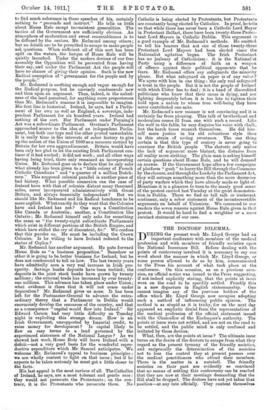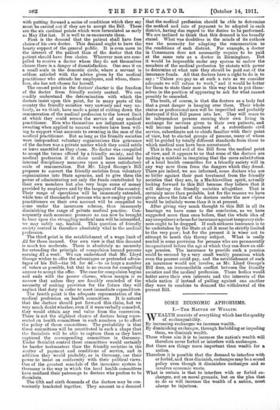THE DOCTORS' DILEMMA.
DURING the present week Mr. Lloyd George had an important conference with members of the medical profession and with members of friendly societies upon the National Insurance Bill. Before dealing with the points of controversy involved it is necessary to say one word about the manner in which Mr. Lloyd George, or some person allowed to do so by him, communicated to the Press his account of what took place at the conference. On this occasion, as on a previous occa- sion, an official notice was issued to the Press suggesting, if not indeed explicitly stating, that the points at issue were on the road to be speedily settled. Frankly this is a new departure in English statesmanship. One cannot imagine any of the previous holders of the office which Mr. Lloyd George now occupies adopting such a method of influencing public opinion. The method is as stupid. as it is tricky, for on the next day appeared an emphatic denial from the representatives of the medical profession of the official statement issued with the Chancellor of the Exchequer's authority. The points at issue were not settled, and. are not on the road to be settled, and the public mind. is only confused and irritated by these devices.
What, then, are the points at issue ? The ultimate issue turns on the desire of the doctors to escape from what they regard. as the present tyranny of the friendly societies, and reciprocally the determination of the societies not to lose the control they at present possess over the medical practitioners who attend their members. There is the matter in a nutshell. The friendly societies on their part are evidently so convinced that no means of settling this controversy can be reached that they are now at their meetings demanding that the Bill shall be dropped. The doctors have not yet taken that position—at any rate officially. They content themselves with putting forward a series of conditions which they say must be carried out if they are to accept the Bill. These are the six cardinal points which were formulated as early as May 31st last. It is well to re-enumerate them. First is the demand that the patient shall have free choice of his own doctor. This demand ought to have the hearty support of the general public. It is even more to the interest of the patient than of the doctor that the patient should have free choice. Wherever men are com- pelled to receive a doctor whom they do not themselves choose there is a danger of dissatisfaction. One sees it on a small scale in the domestic circle, where a servant is seldom satisfied with the advice given by the medical practitioner who attends her employers, and whom, there- fore, she has not chosen for herself.
The second point in the doctors' charter is the freedom of the doctor from friendly society control. We can readily understand the determination with which the doctors insist upon this point, for in many parts of the country the friendly societies very unwisely and very un- fairly, as we think, have made a point of cutting down the remuneration of the medical profession to the lowest limit at which they could secure the service of any medical practitioner. Men who themselves are indignant against sweating when applied to manual workers have been will- ing to support what amounts to sweating in the ease of the medical practitioner. But as long as the friendly societies were independent voluntary organisations this grievance of the doctors was a private matter which they could settle or leave unsettled as they chose. No doctor was compelled to accept the terms offered by a friendly society, and the medical profession if it chose could have insisted by internal disciplinary measures upon a more satisfactory scale of remuneration. But Mr. Lloyd George's Bill proposes to convert the friendly societies from voluntary organizations into State agencies, and to give them the power of administering not only the funds contributed by their own members but also very large sums of money provided by employers and by the taxpayers of the country. Their range of operations will be immensely extended, while tens of thousands of persons who now employ private practitioners on their own account will be compelled to come under the insurance scheme, thus immensely diminishing the range of private medical practice. Con- sequently such economic pressure as can now be brought to bear upon the struggling medical man will be intensified, we may safely say, tenfold. This question of friendly society control is therefore absolutely vital to the medical profession.
The third point is the establishment of a wage limit of £2 for those insured. Our own view is that this demand is much too moderate. There is absolutely no necessity for extending the principle of compulsion beyond persons earning £1. a week. We can understand that Mr. Lloyd George wishes to offer the advantages or pretended advan- tages of his Bill—the 9d. for 4d.—to as large a number of voters as possible, but that is no reason for compelling anyone to accept the offer. The case for compulsion begins and ends with the poorer classes, whose margin is so narrow that unless they are forcibly reminded of the necessity of making provision for the future they will neglect that duty in order to meet immediate expenditure.
The fourth point is the adequate representation of the medical profession on health committees. It is natural that the doctors should put forward this claim, but we very much doubt whether, even if it were verbally conceded, they would obtain any real value from the concession. There is not the slightest chance of doctors being repre- sented on health committees in such numbers as to affect the policy of those committees. The probability is that these committees will be constituted in such a shape that the Socialists will be able to capture them as they have captured the corresponding committees in Germany. Under Socialist control these committees would certainly be harder taskmasters than the friendly societies in the matter of payment and conditions of service, and in addition they would probably, as in Germany, use their power to insist on conformity with their political views. One of the greatest scandals of the insurance system in Germany is the way in which the local health committees have confined their patronage to doctors who profess to be Socialists.
The fifth and sixth demands of the doctors may be con- veniently bracketed together. They amount to a demand that the medical profession should be able to determine the method and rate of payment to be adopted in each district, having due regard to the duties to be performed. We are inclined to think that this demand is too broadly stated. What was doubtless in the minds of its authors was the necessity for adapting the remuneration to the conditions of each district. For example, a doctor in Connemara does not necessarily require to be paid. at the same rate as a doctor in Birmingham. But it would be impossible under any system to endow the members of the medical profession by statute with power to determine at what rate they should be paid out of the insurance funds. All that doctors have a right to do is to say : "Unless you pay us at such a rate as we consider adequate we will refuse to work," and it would be better for them to state their case in this way than to put them- selves in the position of appearing to ask for what cannot possibly be conceded.
The truth, of course, is that the doctors as a body feel that a great danger is hanging over them. Their whole status as professional men will be imperilled and probably destroyed if this Bill passes into law. They will cease to be independent persons earning their own living in exchange for services given to their own patients, and will become instead members of a subordinate civil service, subordinate not to chiefs familiar with their point of view, but to elected groups of persons, many of whom will be guided by totally different standards from those to which medical men have been accustomed.
This is the real evil of the Bill from the medical point of view, and it appears to us that some of the doctors are making a mistake in imagining that the mere substitution of a local health committee for a friendly society will in any way save them from the dangers which they dread. There are indeed, we are informed, some doctors who are so bitter against their past treatment from the friendly societies that they are, in a Machiavellian spirit, actually looking forward to this Bill because they believe that it will destroy the friendly societies altogether. That is certainly more than probable, but for the reasons we have given above the fate of the doctors under the new regime would be infinitely worse than it is at present. After giving very much thought to this Bill in all its bearings we have come to the conclusion, as we have suggested more than once before, that the whole idea of any compulsory scheme for insurance against temporary sick- ness ought to be dropped. If such sickness insurance is to be undertaken by the State at all it must be strictly limited to the very poor ; but for the present it is wiser not to attempt to touch this thorny subject. What is really needed is some provision for persons who are permanently incapacitated before the age at which they can draw an old- age pension. The insurance to provide such a pension could be secured by a very small weekly premium which even the poorest could pay, and the establishment of such an insurance would not involve, as Mr. Lloyd George's Bill does, an irreconcilable conflict between the friendly societies and the medical profession. These bodies would better serve their own interests and the interests of the whole nation if instead of pulling against one another they were to combine to demand the withdrawal of the present Bill.



















































 Previous page
Previous page